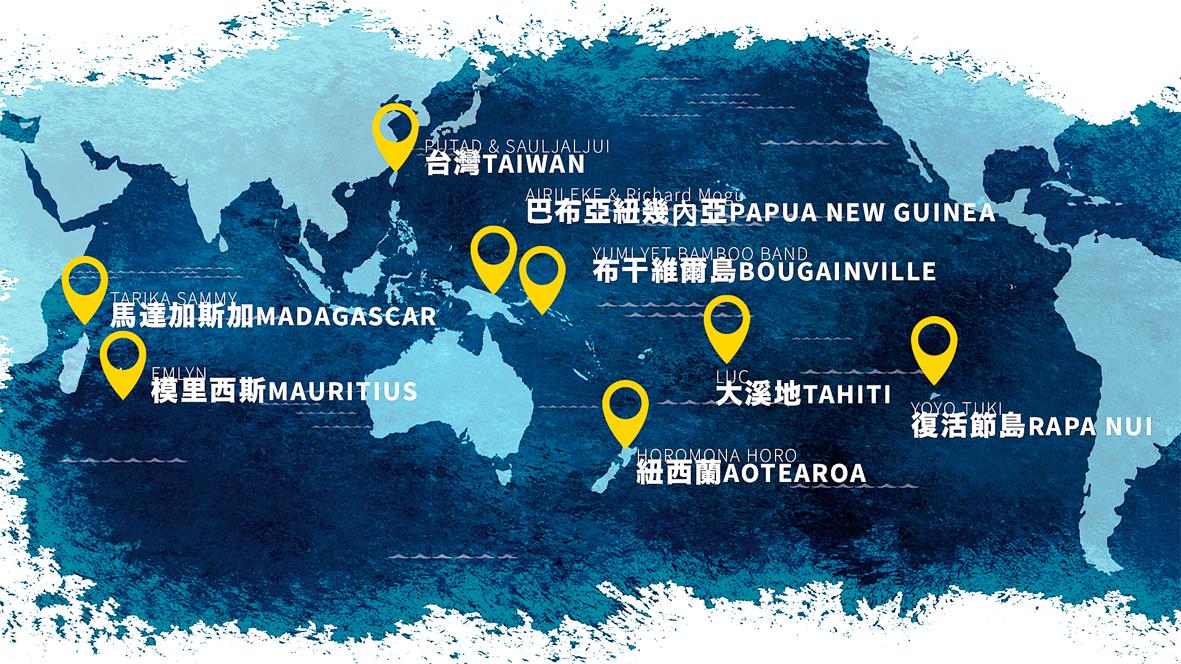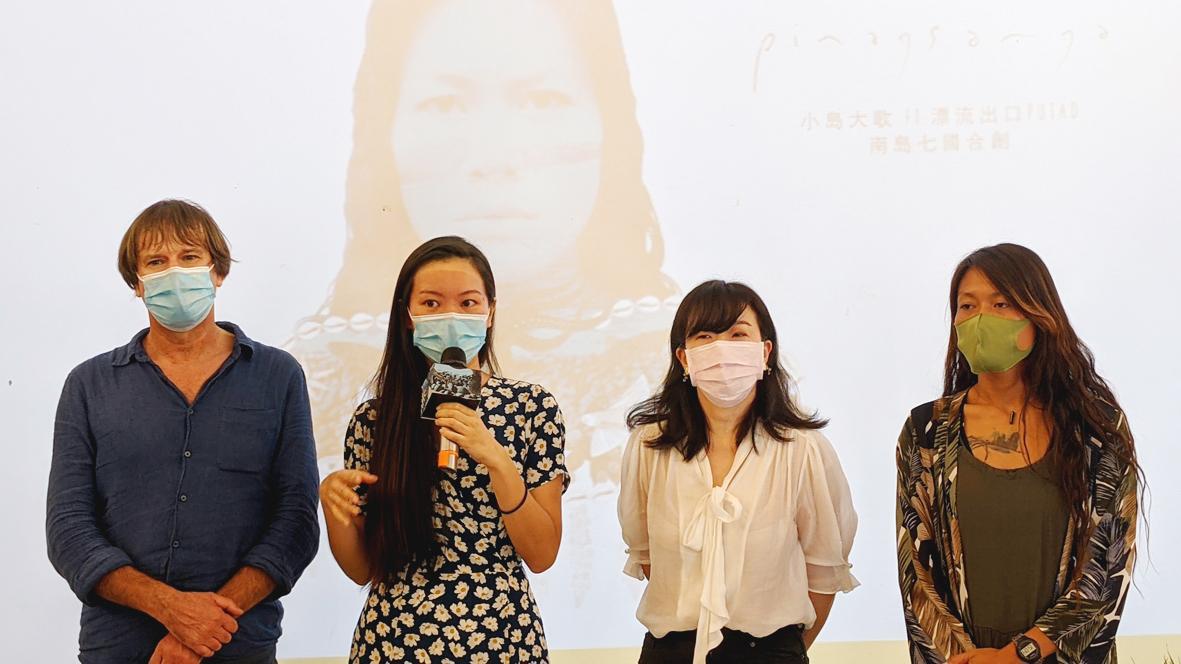Amis musician Putad Pihay almost drowned in the Pacific Ocean 10 years ago when a strong undercurrent carried her far from the shore. The lead singer of the Golden Melody-winning band Outlet Drift (漂流出口) was swimming with her brother and cousin after a night of partying, and she thinks that they were punished because they didn’t respect the ocean.
“Only then did I truly recognize the power of mother nature, and how small humans are,” she says. She channels this experience, as well as matrilineal cultural transmission and environmental erosion, into the song Pinagsanga (“nature”), which was created in collaboration with fellow indigenous or Austronesian musicians from eight islands — plus Paiwan singer Sauljalui.
The song is the Small Island Big Song (小島大歌) project’s first single for its upcoming second album. The music video, shot by filmmaker Hung Shih-ting (洪詩婷) in Putad’s home village in Taitung, premiered on Wednesday in Taipei. Launched by Baobao Chen (陳玟臻) and Tim Cole in 2015 after they learned by chance that the Austronesian peoples — who span from Madagascar to the Pacific Ocean — originated in Taiwan, the project seeks to highlight the nation’s ties to other island peoples and the threats they face from climate change.

Photo courtesy of Small Island Big Song
“We were working on a documentary in Vanuatu when an elder asked where I was from,” Chen says. “When I said Taiwan, he looked surprised and said that’s where his ancestors came from. I couldn’t believe that I didn’t know this.”
Released in 2018, the first album involved the duo traveling to 16 countries and working with over 100 musicians, then boiling down the songs in the studio. For the latest album, Chen and Cole wanted the musicians to take charge and collaborate from the get go. The plan was to fly a group of them to Australia, but COVID-19 forced everything to be done virtually through Zoom meetings.
Putad was aware of the Austronesian connection and had wanted to jam with indigenous musicians from those islands, but she said it’s not in her free-flowing nature to purposely reach out. Once connected through the project, though, she says she felt an inexplicable kinship.

Photo courtesy of Small Island Big Song
“We don’t understand each other’s language, but somehow we’re so similar, and I just can’t say why,” she says. “Thanks to Small Island Big Song for helping me find my family.”
TRANSOCEANIC JOURNEY
Shortly after Chen and Cole left Vanuatu, they quit their jobs and embarked on the journey with scant funding. They asked the musicians to use their native languages and instruments, and explore their relationship to their land, the ocean and the importance of protecting the earth.

Photo: Han Cheung, Taipei Times
“Nothing was written beforehand,” says Cole, a seasoned world music producer who has extensive experience working with Aboriginal Australians and Pacific Islanders. “We met the first artist, they shared a song, we took it to another artist, he added something … we kept adding layers.”
In addition to the album, they also turned their journey into a feature film and toured extensively with many of the musicians — sometimes with enough members to fill a bus. It was no longer a two-person endeavor, but a community with musicians becoming friends and writing songs together.
It was time to let the artists take the lead. The second album wouldn’t have as many musicians, instead featuring a core group collaborating closely throughout the entire process. After regularly meeting on Zoom, Chen noticed that they were no longer just talking about music.
“We started talking about what happened today, what I ate … it became very natural and I think this is where real connections come from,” Chen says. “It’s not just from microphones and music. This time we feel more like a group, like a band that got separated by the ocean. Or rather, the ocean unites us.”
RETURNING TO THE SEA
Having such a distinct and powerful presence as Putad also makes the new material drastically different. The last album was straight up world music, but her unbridled energy and experimental rock sensibilities brings the sound closer to the mainstream.
“She really took our musical style to another level,” Chen says. “She’s on every song.”
The voices of Putad, her grandmother, mother and daughter are heard at the beginning of the track, speaking about the importance of women passing on traditional knowledge in the traditionally matrilineal Amis society.
Putad’s grandmother was a lifelong “sea woman” who was skilled at foraging for seafood. But resources were already dwindling when her mother was learning the ropes.
“The ocean is no longer the same due to overfishing and environmental destruction,” Putad says. “I’m way less familiar with the sea woman ways than they were, and I might not be able to pass it on to the next generation. This is a serious issue that causes me anxiety.”
Chen and Cole were impressed when they first heard Outlet Drift’s music on YouTube, and later they connected through a Global Music Match event.
Putad says she felt an immediate musical connection with her collaborators, who hail from New Zealand, Madagascar, Tahiti, Mauritius, Rapa Nui, Papua New Guinea and Bougainville. Perhaps their gods are connected, Putad says, referring to pre-Christian Amis supernatural entities known as kawas.
“They don’t know who I am, they don’t know my language, but they got my message,” she says.
BALANCING ROLES
Putad wears a paper mulberry dress while drifting through a river into the ocean in the video, which Chen insisted be set near her home village of Pisirian.
“They invited me to see her live, and she’s just unapologetically jamming out on the stage and drinking beer,” Hung says. “Her voice is so raw, but so effective and truthful. It would be beautiful if I could understand the lyrics, but I got a bit of the spirit she’s trying to convey.”
They traveled to Putad’s home by the sea in April, then went to visit Sauljalui in the mountains of Pingtung. Both singers appear in their respective home environments, and Hung compares the juxtaposition to water flowing from the mountain to the ocean.
“It symbolizes Taiwan as the root of it all since the [Austronesians] came from here,” she says.
As non-indigenous people, it’s a tricky balance for Cole and Chen to figure out the role they should play. Cole says he has been working on cross-cultural productions since the 1980s when he headed to Papua New Guinea with his band.
“I found that I have the sensibilities to work in these projects and keep my voice out of it,” he says. “We are aware of this and think about it all the time. It’s about building trust and respect with the artists and listening to them and getting their approval of the songs. There was a lot we had to change on the last album, which is the process.”
Chen says that they also made sure that the musicians are adequately compensated for their talents, receiving 50 percent of the profits.
“Sauljalui came over last week and she was talking about how surprised she was that we changed all the things she didn’t like in the last album, and that we were really listening to what she had to say. I think that’s a big acknowledgement for me because I do try to make the best decisions for everyone. This is more than just the two of us.”
Putad says she’s heard criticism that Chen and Cole aren’t indigenous, but she says, “Without them connecting us, I would never have done this.”

March 10 to March 16 Although it failed to become popular, March of the Black Cats (烏貓進行曲) was the first Taiwanese record to have “pop song” printed on the label. Released in March 1929 under Eagle Records, a subsidiary of the Japanese-owned Columbia Records, the Hoklo (commonly known as Taiwanese) lyrics followed the traditional seven characters per verse of Taiwanese opera, but the instrumentation was Western, performed by Eagle’s in-house orchestra. The singer was entertainer Chiu-chan (秋蟾). In fact, a cover of a Xiamen folk song by Chiu-chan released around the same time, Plum Widow Missing Her Husband (雪梅思君), enjoyed more

Last week Elbridge Colby, US President Donald Trump’s nominee for under secretary of defense for policy, a key advisory position, said in his Senate confirmation hearing that Taiwan defense spending should be 10 percent of GDP “at least something in that ballpark, really focused on their defense.” He added: “So we need to properly incentivize them.” Much commentary focused on the 10 percent figure, and rightly so. Colby is not wrong in one respect — Taiwan does need to spend more. But the steady escalation in the proportion of GDP from 3 percent to 5 percent to 10 percent that advocates

From insomniacs to party-goers, doting couples, tired paramedics and Johannesburg’s golden youth, The Pantry, a petrol station doubling as a gourmet deli, has become unmissable on the nightlife scene of South Africa’s biggest city. Open 24 hours a day, the establishment which opened three years ago is a haven for revelers looking for a midnight snack to sober up after the bars and nightclubs close at 2am or 5am. “Believe me, we see it all here,” sighs a cashier. Before the curtains open on Johannesburg’s infamous party scene, the evening gets off to a gentle start. On a Friday at around 6pm,

A series of dramatic news items dropped last month that shed light on Chinese Communist Party (CCP) attitudes towards three candidates for last year’s presidential election: Taiwan People’s Party (TPP) founder Ko Wen-je (柯文哲), Terry Gou (郭台銘), founder of Hon Hai Precision Industry Co (鴻海精密), also known as Foxconn Technology Group (富士康科技集團), and New Taipei City Mayor Hou You-yi (侯友宜) of the Chinese Nationalist Party (KMT). It also revealed deep blue support for Ko and Gou from inside the KMT, how they interacted with the CCP and alleged election interference involving NT$100 million (US$3.05 million) or more raised by the